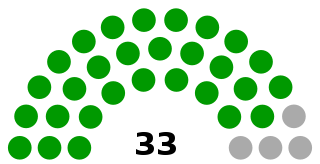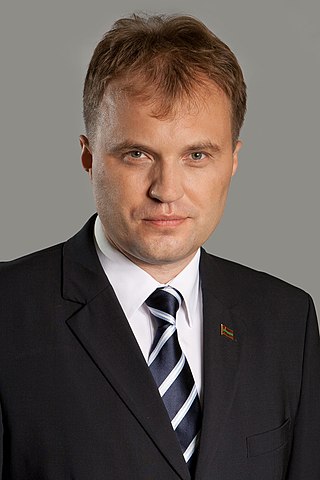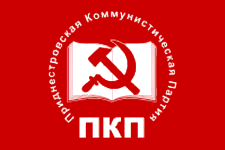
Transnistria, officially known as the Pridnestrovian Moldavian Republic (PMR), is a breakaway state internationally recognized as part of Moldova. Transnistria controls most of the narrow strip of land between the Dniester river and the Moldova–Ukraine border, as well as some land on the other side of the river's bank. Its capital and largest city is Tiraspol. Transnistria is officially designated by the Republic of Moldova as the Administrative-Territorial Units of the Left Bank of the Dniester or as Stînga Nistrului.

Igor Nikolaevich Smirnov is a Russian-born Transnistrian politician who served as the first president (1991–2011) of the internationally unrecognized Pridnestrovian Moldovan Republic.

The politics of Transnistria, a de facto independent state situated de jure within the Republic of Moldova in Eastern Europe, take place in a framework of a semi-presidential republic, whereby the President of Transnistria is head of state and the Prime Minister of Transnistria is head of government. Executive power is exercised by the government. Legislative power is vested in both the government and parliament. Formally, Transnistria has a multi-party system and a unicameral parliament, called the Supreme Council. The president is elected by popular vote. The latest parliamentary elections were held in November 2020.

The Transnistrian War was an armed conflict that broke out on 2 November 1990 in Dubăsari between pro-Transnistria forces, including the Transnistrian Republican Guard, militia and neo-Cossack units, which were supported by elements of the Russian 14th Army, and pro-Moldovan forces, including Moldovan troops and police.

The Supreme Council of the Pridnestrovian Moldavian Republic is the parliament of Transnistria. The unicameral legislature consists of 33 seats, all of which are determined by single mandate constituencies. It is headed by a chairman.

Yevgeny Vasilyevich Shevchuk is a Transnistrian former politician who served as the second President of Transnistria, from 2011 to 2016.
Aleksandr Radchenko was an ethnic Ukrainian politician and human rights activist from Transnistria. A former Soviet military officer, he was the editor of a small opposition newspaper in Tiraspol called Chelovek i ego prava. Most of his articles deal with human rights issues.

The state of affairs with human rights in Transnistria has been criticized by several governments and international organizations. The Republic of Moldova, and other states and non-governmental organizations (NGOs) claim that the government of Transnistria is authoritarian and has a record of arbitrary arrest and torture.
Andrei Safonov is a politician from Transnistria. He lives in Bender, Transnistria's second largest city.
Nadezhda Andreevna Bondarenko is a Transnistrian politician who has served as the acting chairperson of the Transnistrian Communist Party (PKP) since late 2018. She was formerly a police officer, and was the PKP's candidate for the 2006 presidential election. She is currently the editor-in-chief of the PKP's party newspaper, Pravda Pridnestrovya. She is of Russian and Ukrainian descent.

The Transnistrian Communist Party is a communist party in the unrecognized state of Transnistria. The party was led by Oleg Khorzhan until his arrest and imprisonment in 2018.

The Pridnestrovian Moldavian Soviet Socialist Republic (PMSSR), also commonly known as Soviet Transnistria or simply as Transnistria, was created on the eastern periphery of the Moldavian Soviet Socialist Republic (MSSR) in 1990 by pro-Soviet separatists who hoped to remain within the Soviet Union when it became clear that the MSSR would achieve independence from the USSR and possibly unite with Romania. The PMSSR was never recognised as a Soviet republic by the authorities in either Moscow or Chișinău. In 1991, the Pridnestrovian Moldavian Republic succeeded the Pridnestrovian Moldavian Soviet Socialist Republic.

Presidential elections were held in the breakaway republic of Transnistria on 9 December 2001. The result was a victory for incumbent President Igor Smirnov, who received 82% of the vote. The other candidates were Tom Zenovich, mayor of Bender, and Alexander Radchenko of the Power to the People party, which advocated reunion with Moldova. The Moldova Country Reports on Human Rights Practices for 2003, released by the Bureau of Democracy, Human Rights, and Labor of the U.S. Department of State on February 25, 2004, stated "Citizens' right to change their government was severely restricted in Transnistria. In the period prior to the 2001 "presidential" elections, authorities shut down a political party and a youth group, closed a leftist party newspaper, and seized a press run. The authorities refused to register one potential presidential candidate and dismissed another from his job as mayor of Bender prior to the election. Authorities reportedly threatened workers with job loss and students with expulsion from their universities if they did not vote for the incumbent, Igor Smirnov. Local observers reported that the actual voting was unfair, with considerable ballot box stuffing. Officials in the northern region of Kamenka reported that 103.6 percent of their voters cast ballots for Smirnov." According to an article by the ethnic Russian researcher from Moldova Alla Skvortsova from 2002, "polls and elections in the PMR may to some extent have been rigged".

This timeline of events is a chronological list of incidents and other notable occurrences related to the War of Transnistria, including events leading up to the war.

Valeriu Mițul was a Moldovan politician, an opponent of the separatist regime that is in power in Transnistria.

Parliamentary elections were held in the breakaway republic of Transnistria on 10 December 2000. 42 Out of 43 seats were up for election, most of which were won by independent candidates. Women made up 4 of the 42 elected representatives. Grigore Mărăcuţă was elected for a third term as speaker, having the support of 39 out of 41 representatives present at his election. According to an article by the ethnic Russian researcher from Moldova Alla Skvortsova from 2002, "polls and elections in the PMR may to some extent have been rigged".

Presidential elections were held in the breakaway republic of Transnistria on 22 December, 1996. They were won by the incumbent Igor Smirnov, who ruled Transnistria since 1991. Smirnov's only opponent was Vladimir Malakhov, who was beaten by Smirnov, 72% to 20%.

Presidential elections were held in the breakaway republic of Transnistria on 1 December, 1991. These were the first such elections in the newly founded Pridnestrovian Moldavian Republic, and were won by Igor Smirnov, one of the country's founders. Smirnov faced two opponents: Grigore Mărăcuţă and Grigoriy Blagodarniy. Mărăcuţă would become an ally of Smirnov and was speaker of the Supreme Council until 2005. According to an article by the ethnic Russian researcher from Moldova Alla Skvortsova from 2002, "polls and elections in the PMR may to some extent have been rigged".

Presidential elections were held in Transnistria on 11 December 2011. As no candidate received more than 50% of the vote in the first round, a run-off was held on 25 December.

Parliamentary elections were held in Transnistria on 29 November 2020, alongside municipal elections.










